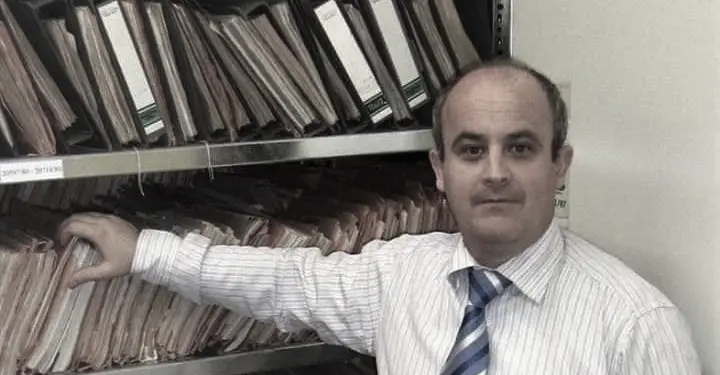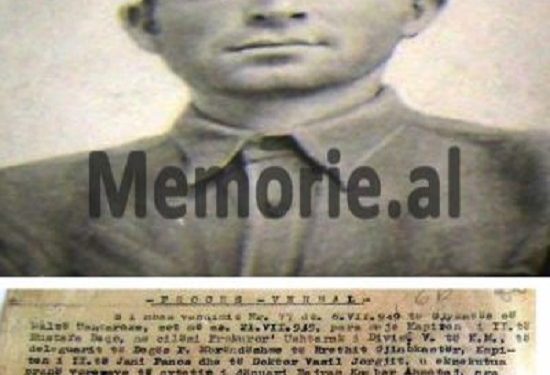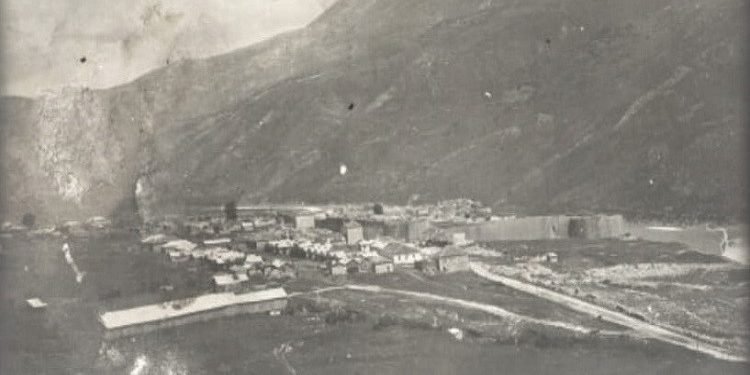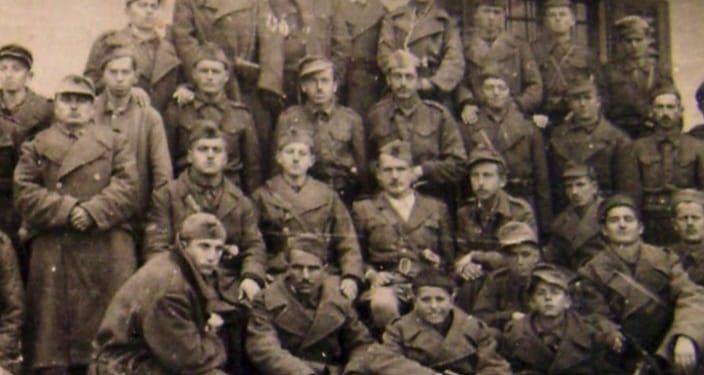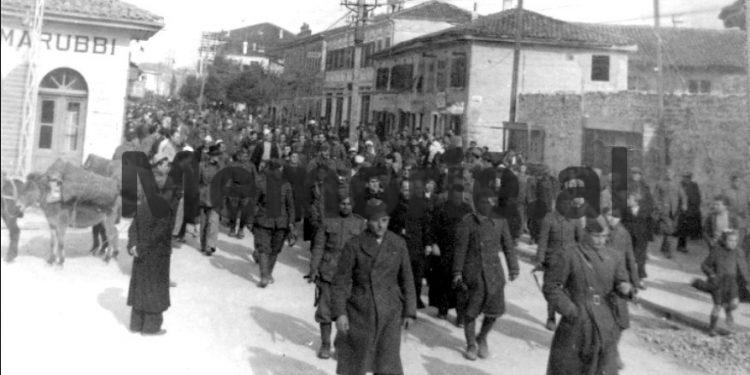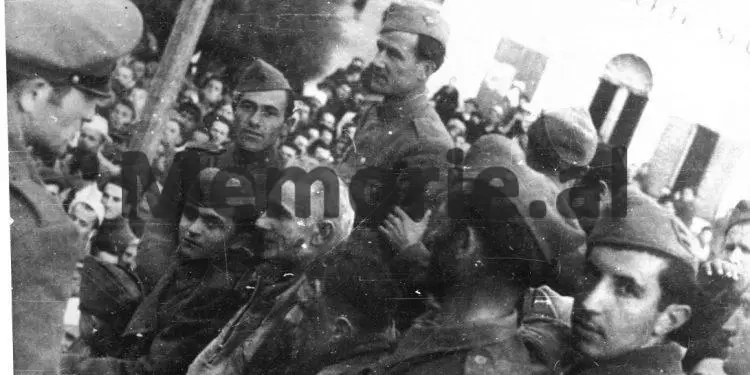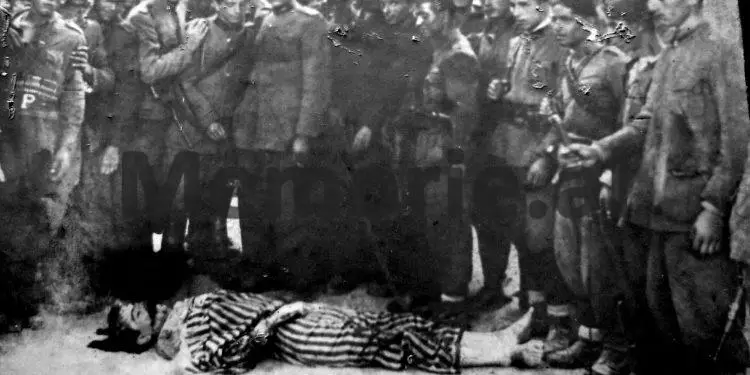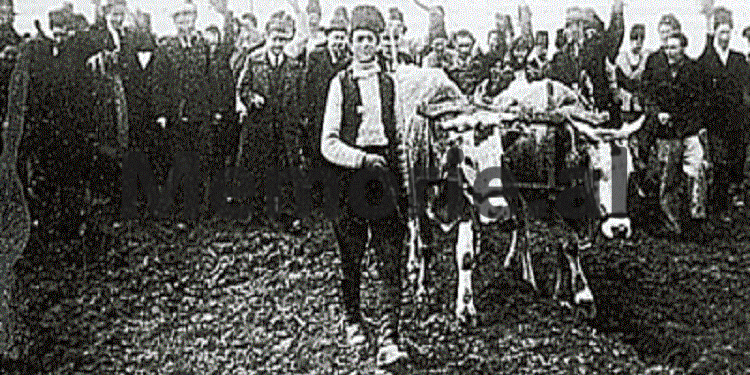By Kastriot Dervishi
Memorie.al / An uprising against the communist regime took place in 1948. It was not very popular, while it was the subject of study by researchers Uran Butka and Sadik Bejko. The uprising, known as the Zhapokika uprising, because of the name of the village where it took place, is the most well-known movement of this time that took place in southern Albania. Zhapokika is a village in Tepelena. The revolt that broke out in this village had as its starting point the dissatisfaction of the local peasantry against the communist regime, against its power, and as a defense against the evil that had plagued Albania.
The villagers of Zhapokika protested against communism after realizing that they had all suffered from it. The destruction of the economic base in the village, heavy taxes, the seizure of land, livestock, etc., had made the villagers of the area very unhappy. “This government took our land, our wealth and left us in a bad situation” – the convicts expressed themselves. Xhemal Brahimi was one of the convicts of the Movement.
He was active in the Anti-Fascist War, in the ranks of the “National Front”. He was able to maintain contacts with the villages of Tepelena, such as Zhapokika, Luftinja, Kamçishti, Salaria, Plashniku, Levani, Gllava, etc. The agitation that Xhemali carried out with the villagers had to do with their poor situation, that the anti-communists were supported abroad, that the Anglo-Americans would intervene, etc.
Creation of the anti-communist detachment
In his effort, Xhemali was supported by former gendarme Bajram Ahmetaj, former village functionary Mehmet Yzeiri, policeman Salo Kalo, farmers Sefer Yzeiri and Safet Kamberi, former major Sulo Zaimi, etc. The movement had connections with the Mallakastër, Gjirokastër and Berat areas. Through this propaganda, they managed to recruit about 25 armed people. On September 20, 1948, the “Baba Shefqet” detachment was formed, in honor of the Bektashi cleric shot by the communists on January 14, 1948. The detachment’s flag was the national flag without the communist red star. The members of the detachment swore that they would not betray. On September 28, 1948, the detachment’s command was elected by vote:
-Xhemal Brahimi – political commissar
-Baram Ahmetaj – commander
-Mehmet Yzeiri – deputy commander
-Salo Kaso – staff member
-Sefer Yzeri – leader of the assassins’ squad
The detachment set itself the task of connecting with other anti-communist groups until a democratic nationalist government was established in Albania. Most of the members of the squad were from Zhapokika and Luftinja. The squad, considering it a political group, held several meetings. The first one was held in a place called Ledhi i Madh, the second meeting was held on the mountain of Zhapokika and the next one was held in Kamchist. From this development and the environment where it was held, the formation grew.
The fact that the activity took place in mountainous areas and that the regime could not understand that in Tepelena, there could be major problems with its overthrow had a positive effect. The regime forces went to arrest Gani Kodheli, who had previously been invited by the squad to join them, but who had refused. At this moment, the squad fired on the police and this time Gani joined the squad. On October 2, 1948, the squad attacked the Pursuit Forces, after they had detained 3 anti-communists. The government forces withdrew after this attack by the squad.
The communist regime forces were already in pursuit. After breaking the siege in Plasnik and Molisht, the squad took control of Berat, but was hit in Glavë on October 8, 1948. Two people were killed by the government forces, while Mehmet Yzeiri and Salo Kaso were killed by the squad. This was also the most serious blow to the cheta, which suffered a setback. Some surrendered, others were arrested, and still others escaped. Shaqo Limja and Sefer Yzeri stayed longer. Bajram Ahmetaj was arrested in January 1949.
In the court decision, the date of his arrest is initially left blank, but then the date 4.1.1949 is filled in. Sefer Yzeiri, expressed: “I was dissatisfied with the government and I talked to Safet Kamberi and Xhemal Brahimi, who spoke to me against the government, that this government took our land, took our wealth and left us in a bad situation. We held three meetings, where Xhemal Brahimi spoke. People came voluntarily…in Gllavë we were surrounded by the army. I escaped the siege.
The trial
The regime was interested in holding a quick and exemplary trial. Initially, the trial was held in the Military Court of Gjirokastra. A jury composed of Llazi Polena, Arqile Toska and Hamit Bilbili, with the prosecutor Mustafa Beqo present, issued decision no. 24, dated 14.5.1949.
Based on the prosecutor’s claim, they were accused of: “They formed an armed gang in order to overthrow the popular government, they participated in fighting against government forces, killed two policemen and the head of the Security Section, Xhezo Makashi, and that they had conspired to kill two villagers”.
Based on a quick trial, the court imposed the following sentences:
1 – Bajram Ahmetaj, aged 59, arrested on 4.1.1949, to death.
2 – Sefer Yzeri, aged 39, arrested on 10.10.1949, to death.
3 – Shaqo Muçoderraj, aged 29, arrested on 16.10.1948, to 20 years in prison.
4 – Xhemal Asllani, aged 21, arrested on 5.10.1948, to 15 years in prison.
5 – Xhemal Begaj, aged 35, arrested on 10.10.1948, to 12 years in prison.
6 – Mete Didi, aged 36, arrested on 19.10.1948, sentenced to 15 years in prison.
7 – Balil Veliu, aged 39, arrested on 10.10.1948, sentenced to 15 years in prison.
8 – Xhelal Begaj, aged 35, arrested on 10.10.1948, sentenced to 12 years in prison.
9 – Gani Kodheli, aged 36, arrested on 16.10.1948, sentenced to 12 years in prison.
10 – Mehmet Muçoderraj, aged 21, arrested on 5.10.1948, sentenced to 12 years in prison.
11 – Hajri Mahmutaj, aged 39, arrested on 10.10.1948, sentenced to 12 years in prison.
12 – Selfo Xhemali, aged 49, arrested on 16.10.1948, sentenced to 4 years in prison.
13 – Beg Veizi, aged 49, arrested on 5.10.1948, sentenced to 4 years in prison.
14 – Nuredin Rrodhaj, aged 29, arrested on 5.10.1948, sentenced to 4 years in prison.
15 – Hajredin Alushi, aged 33, arrested on 16.10.1948, sentenced to 4 years in prison.
16 – Mehmet Kalemaj, aged 49, arrested on 16.10.1948, sentenced to 4 years in prison.
17 – Teme Pajo, aged 49, arrested on 5.10.1948, sentenced to 3 years in prison.
18 – Shefqet Didi, aged 19, arrested on 16.10.1948, sentenced to 3 years in prison.
19 – Seit Çaushaj, aged 34, arrested on 10.10.1948, sentenced to 3 years in prison.
20 – Jashar Canaj, aged 44, arrested on 10.10.1948, sentenced to 3 years in prison.
21 – Maliq Didi, aged 57, arrested on 5.10.1948, sentenced to 2 years in prison.
22 – Demo Aliu, aged 45, arrested on 5.10.1948, sentenced to 2 years in prison.
23 – Riza Çaushi, aged 49, arrested on 10.10.1948, sentenced to 2 years in prison.
24 – Mufit Islami, aged 29, arrested on 5.10.1948, sentenced to 2 years in prison.
25 – Adem Memaj, aged 21, arrested on 10.10.1948, sentenced to 12 years in prison.
All defendants were ordered to serve a sentence of forced labor, confiscation of property, and their right to vote was temporarily revoked. According to the prosecutor, the sentences were based on the infamous law no. 372, dated 12.12.1946; “On criminal offenses against the people and the state”. This decision in general (for sentences with deprivation of liberty), was upheld by the Supreme Military Court, composed of Bilbil Klosi, Sotir Spiros and Nonda Papuli, with the military prosecutor, Bexhet Mema, with decision no. 77, dated 6.7.1949.
But immediately after the decision, President Bilbil Klosi wrote on 8.7.1949 to the Presidium of the People’s Assembly, on the issue of pardoning or not the 7 death row convicts. In this letter, Klosi stated that; the second convict of the Zapokika process could be spared life. This must have happened, since it does not appear that the second convict was shot.
Execution
On 21.7.1949, the execution of the death sentence of the convict Bajram Kamber Ahmetaj was carried out. He says: “For Lieutenant Xhezo Makashi, I heard the prison guards say, whoever killed him, these are the ones who got it”. Bajrami demanded that the government not take revenge on their children, so that they could take his corpse to his family, etc. In the end, he ends his life, with the words “Long lives Albania”.
The deserter and the martyr
The main leader of the Zapokika Movement, Xhemal Brahimi, was able to escape from Albania, first to Greece and then to the USA. He came many times near the borders of Albania, without being able to realize his dream, the overthrow of the communist regime! Meanwhile, the chief of the Tepelena Security, Xhezo Makashi (1920-1948), with decision no. 65, dated 2.10.1971, was declared a “Martyr of the Homeland”. Memorie.al




